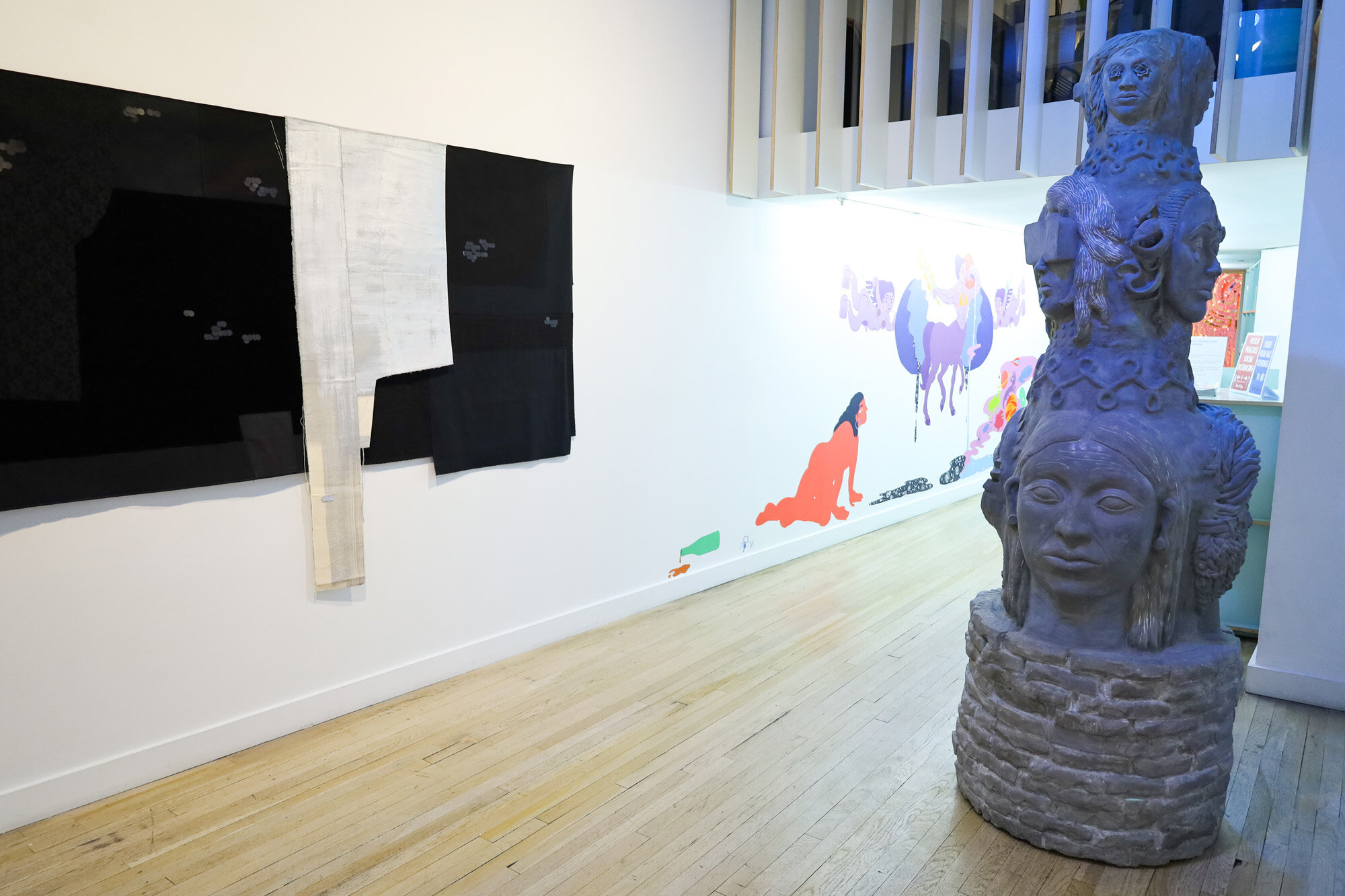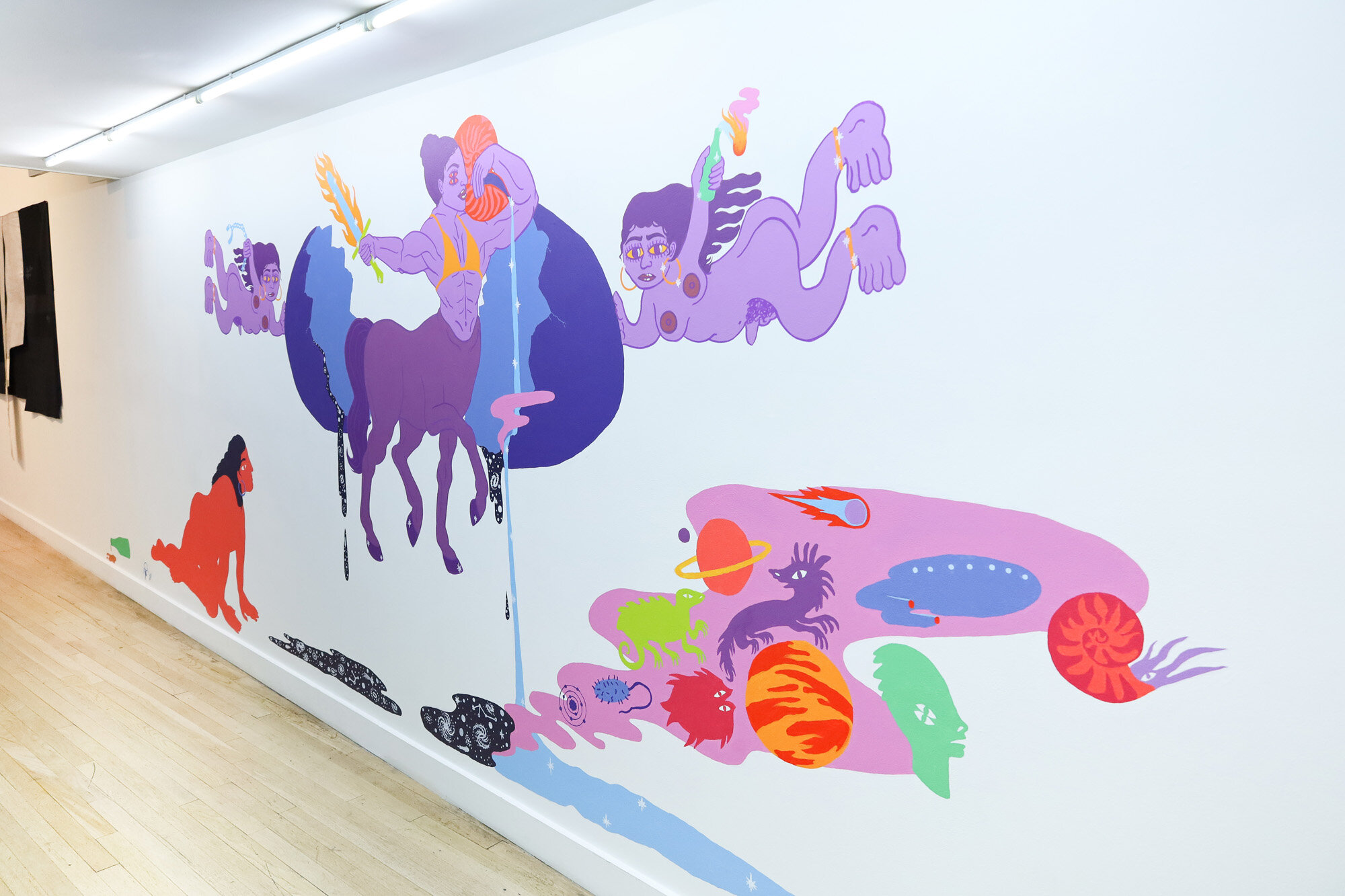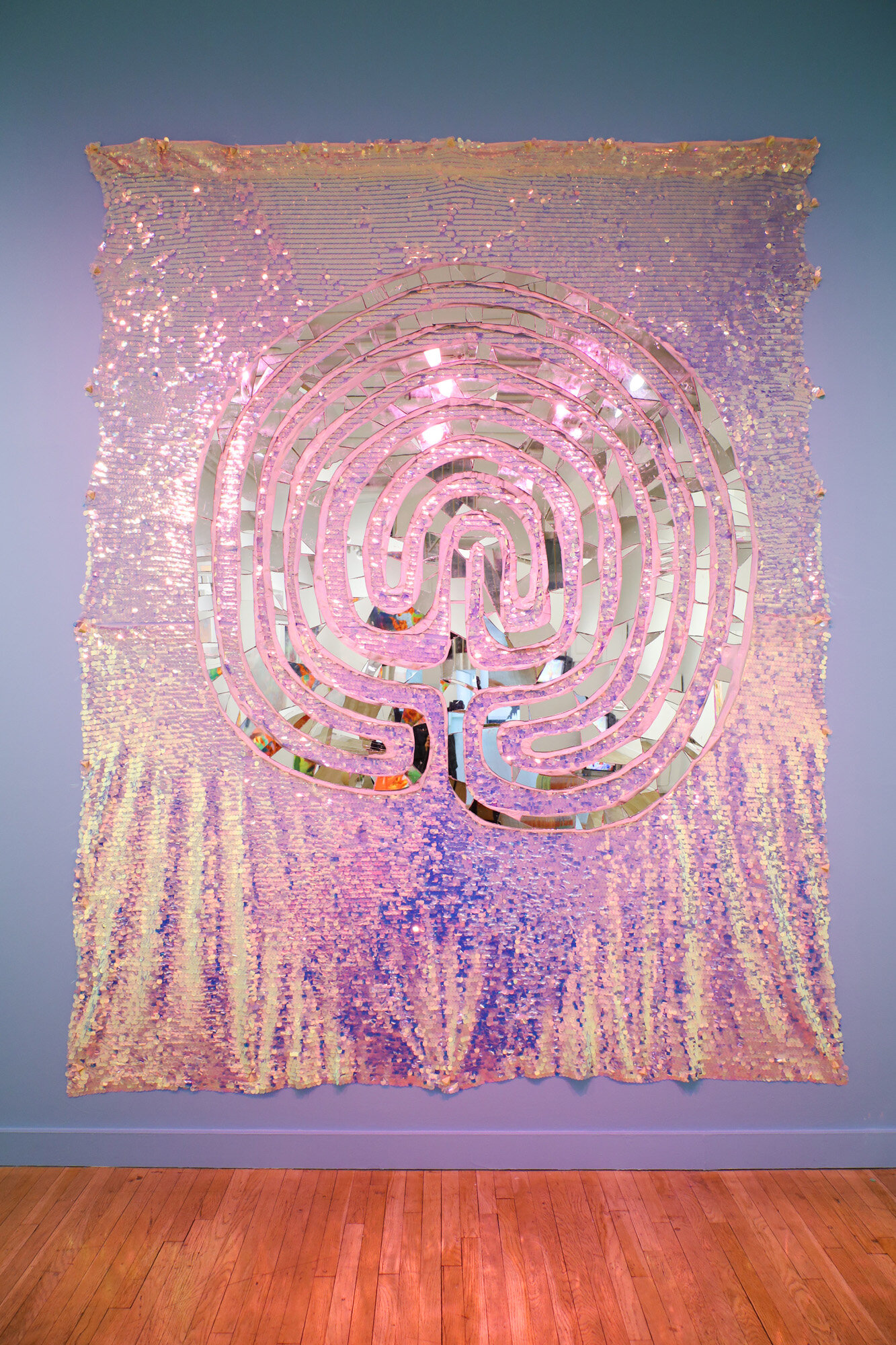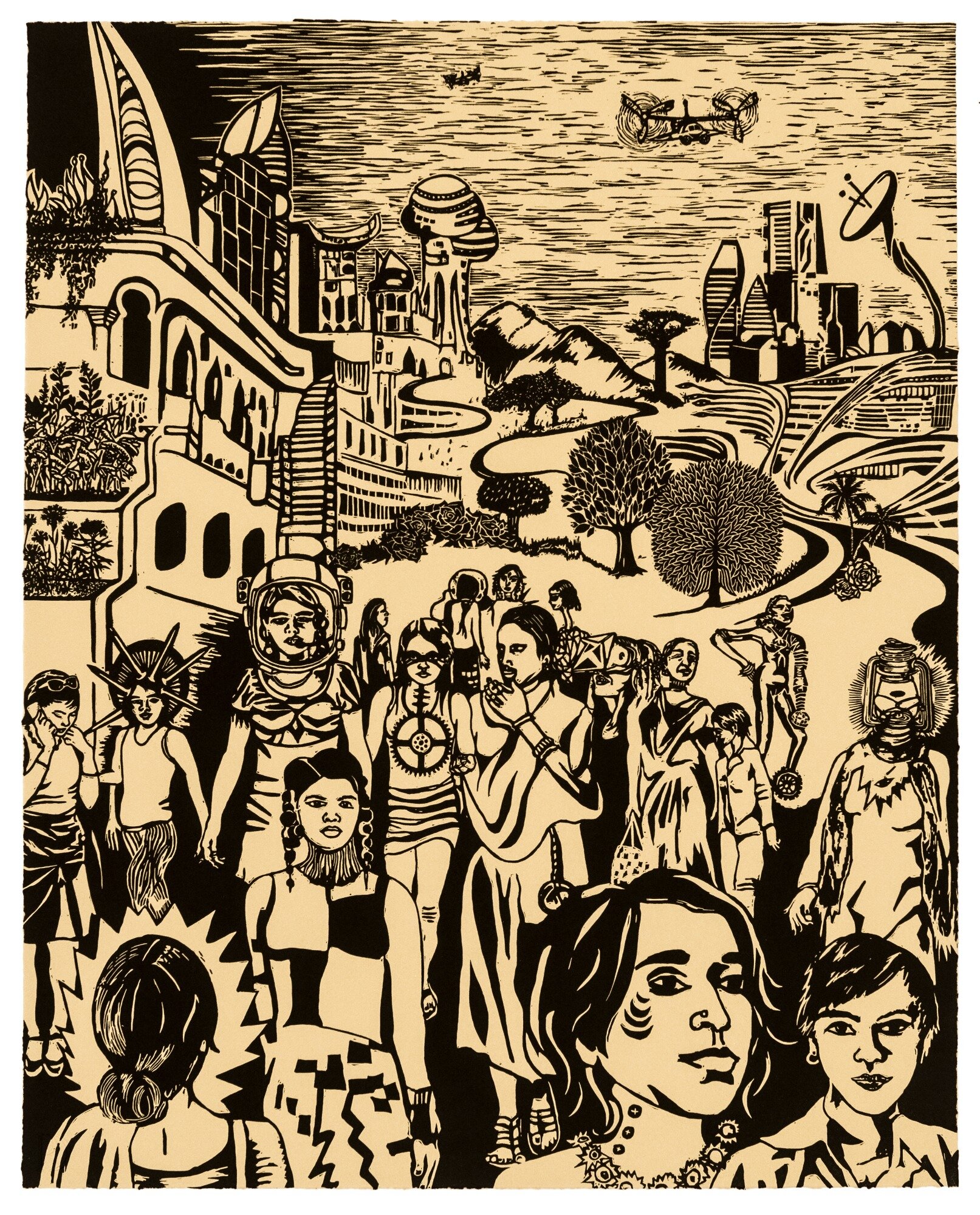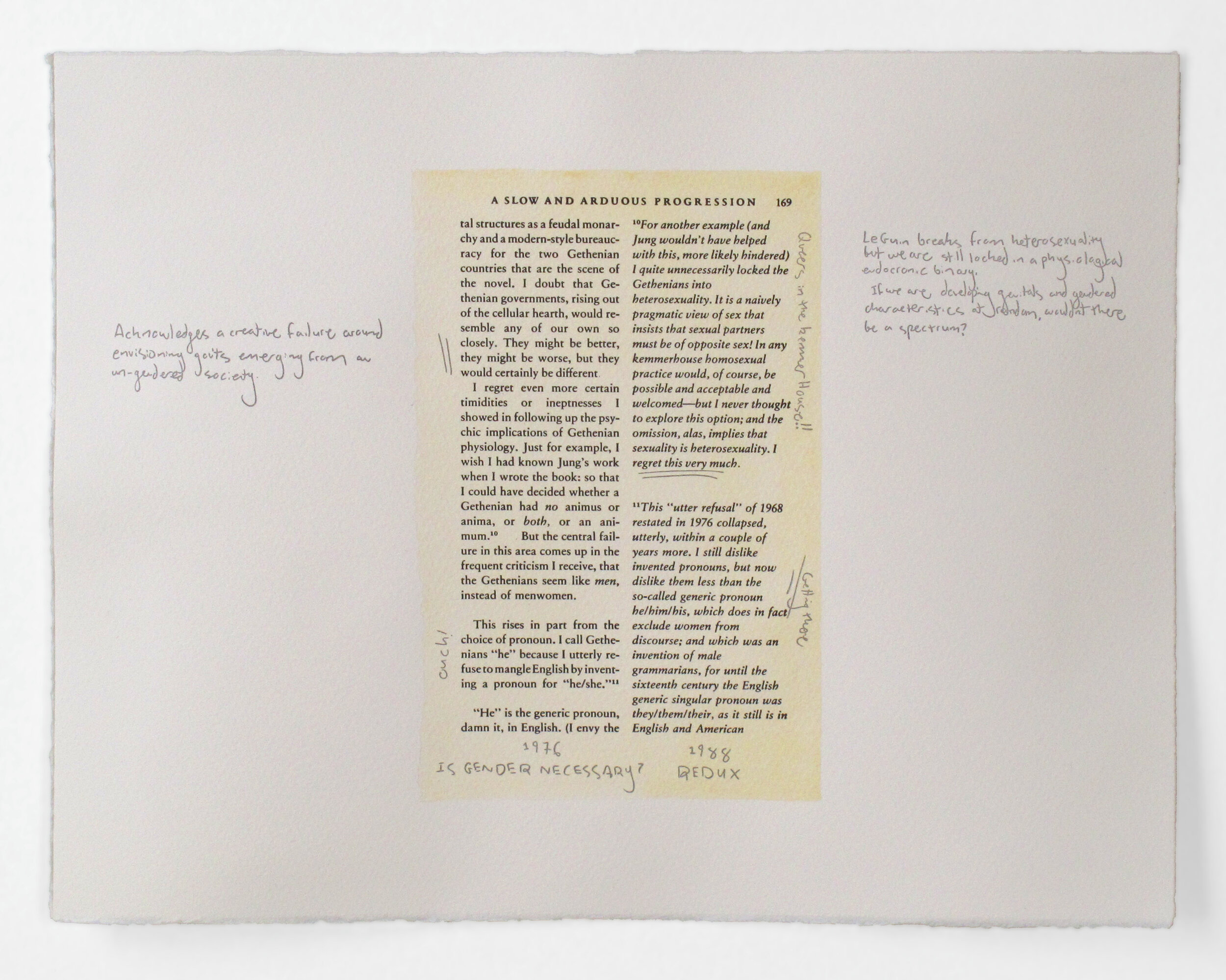Amaryllis DeJesus Moleski, Even there, there are stars, 2020. Watercolor, gouache, color pencil, and marker on paper,
15 3/8 x 21 5/8 inches.
Even there, there are stars
Chitra Ganesh, Amaryllis DeJesus Moleski, Emily Oliveira, and Tuesday Smillie
Organized by Allie/A.L. Rickard
Mentor: Daniel J Sander
January 14 – February 17, 2021
CUE Art Foundation is pleased to present Even there, there are stars, a group exhibition featuring Chitra Ganesh, Amaryllis DeJesus Moleski, Emily Oliveira, and Tuesday Smillie, organized by Allie/A.L. Rickard. Even there, there are stars celebrates visions and dreams of possible, and more just, futures arising in dialogue with visionary fiction, and explores pathways that might help us get there. These futurities are generated by and sustain queer and trans people, femmes, and people of color: those of us who have learned to live by and through our longings; those of us who were never meant to survive and do, by our collective resilience and our collective dreams.
The work included in this exhibition, and the thoughts in the accompanying publication, take up these tactics to help us be bold, center pleasure, and stay connected and interdependent so as to be able to live guided by our wildest dreams of liberation. The exhibition features more than 25 works ranging from large-scale textiles and works on paper to prints, video, and sculpture. New works include a 25-foot site-specific mural by Emily Oliveira, an archival digital print by Chitra Ganesh, and a newly commissioned illustration by Amaryllis DeJesus Moleski featured in the accompanying exhibition catalogue.
Even there, there are stars follows the work of Walidah Imarisha in Octavia’s Brood: Science Fiction Stories from Social Justice Movements (2015) in understanding visionary fiction as that which has “relevance toward building new, freer worlds [rather than] the mainstream strain of science fiction, which often reinforces dominant narratives of power,” and that which “encompass[es] all of the fantastic, with the arc always bending toward justice.” Sometimes, bringing more just and free worlds into our imaginations is a process of visioning something new, something utterly different than what and where we find ourselves to be now. And, sometimes it’s a process of remixing, of starting where we are, even if that is within a narrative that reinforces dominant powers, and fucking that shit up! In any case, it’s a creative, radical imaging that is as much about helping us see pathways to our futures as it also helps us reflect on our present realities and multiple pasts. We invite you to get with us and bring your wildest imaginings for the future into dialogue with Amaryllis, Chitra, Emily, and Tuesday.
Chitra Ganesh, Eclipse, 2020. Archival digital print, 42 x 59 3/5 inches.
Allie/A.L. Rickard (she/her/hers; they/them/theirs) curates and organizes in the arts. Their recent projects include co-curating Nobody Promised You Tomorrow: Art 50 Years After Stonewall with Margo Cohen Ristorucci, Lindsay C. Harris, Carmen Hermo, and Lauren A. Zelaya; organizing around sexual harassment, wage equity, and labor rights at the Brooklyn Museum; and co-hosting Queer Art Radio on KPISS FM with Zelaya. They have also recently contributed to publications for the 2019 Whitney Biennial; We Wanted a Revolution: Black Radical Women, 1965-85; and Lorraine O’Grady: Both/And. They are currently completing graduate work at the Center for Curatorial Studies, Bard College, where they continue to organize around racial justice, accessibility, and wage equity. Their thesis, Cripping Curatorial Studies, practices accessibility as a constitutive part of, and interference with, curatorial practice and study.
Daniel J Sander, PhD, is an independent curator and academic. Recent projects include Brontez Purnell: 100 Boyfriends Mixtape/ Episode 3: FUCKBOY ANTHEM: HOW I SPENT MY SUMMER VACATION (2020), Remote Intimacies (2020), Kalup Linzy Pride Performance (2020), the Leslie-Lohman Queer Theater & Performance Residency for Emerging Artists (2018-2020), Arch (2019), Ben Ross Davis: Endosymbiosis (2019), Alex Schmidt: Group Fail Pony Play (2018), Haptic Tactics (2018), and a special issue of the journal Women & Performance entitled “Queer Circuits in Archival Times” (2018), based on a conference of the same name he co-organized in 2016. He has taught courses at New York University and Yale University and been a guest lecturer, critic, and/or reviewer at the Rhode Island School of Design, the International Center of Photography, Hunter College, University of Mississippi, New York University, Pratt Institute, Maple Terrace, Parsons School of Design, Bard College, and the Wassaic Project.
Chitra Ganesh is a visual artist who lives and works in Brooklyn. Ganesh’s drawing-based practice brings to light narrative representations of femininity, sexuality, and power typically absent from canons of literature and art. Her wall installations, comics, animation, and mixed media works on paper often take historical and mythic texts as inspiration and points of departure to complicate received ideas of iconic female forms. Her work has been widely exhibited in the United States, Europe and South Asia. Her installation, A city will share her secrets if you know how to ask, is currently on view at Leslie-Lohman Museum of Art through October 2021.
Amaryllis DeJesus Moleski is an interdisciplinary artist whose work reimagines femmes of color as protagonists of historical, spiritual, and religious narratives that make up the foundation of today’s societal beliefs and culture. Whether through drawing, video, performance, or installation, DeJesus Moleski experiments with how to name the conflation of celebration and mourning when being racialized, liminal, and alive. DeJesus Moleski grew up moving from city to country to city in the American East Coast, South, and Midwest. Spending her most formative years in a constantly shifting landscape has tethered her work to interests in multiplicity, belief systems, and bewilderment. She has an ongoing practice of tending to the in-between, and those that know the trouble and pleasure there. Employing flamboyance as an exercise in utopic fantasies for the future, her work is a dream sequence triggered by our current time. She graduated with an MFA from the Yale School of Art and has exhibited with the Brooklyn Museum and with MoCADA. Her work has been featured in Teen Vogue, New American Paintings, Art of Choice, Hyperallergic, the Huffington Post, and Momma Tried Magazine.
Emily Oliveira is an interdisciplinary artist and performer. She uses textiles, sculpture, video, and installation to explore narratives of communion and disruption in a queer, sci-fi utopia. She is a graduate of the Rhode Island School of Design and a current MFA candidate at Yale. She has exhibited and performed widely in venues including Vox Populi, Wave Hill, Disclaimer Gallery, SPRING/BREAK, and Judson Memorial Church. She has received awards and residencies from institutions including MAD, Yaddo, Ars Nova, and BRIC. She was a 2019 Van Lier Fellow at Wave Hill and a 2020 NYFA Artist Fellow. In 2023, she will be the Abbey Awards Fellow at the British School at Rome.
Tuesday Smillie is a visual artist working in a variety of mediums including textiles, collage, printmaking, and watercolor. At the core of her work is a question about the individual and the group: the binary of inclusion and exclusion and the porous membrane between the two. Smillie lives and works in New York. In 2018, she had solo exhibitions at the Rose Art Museum and Participant Inc. Her work has also been shown at the New Museum, Brooklyn Museum, Museu de Arte de São Paulo (MASP), and Haus der Kunst, Munich. Smillie has been an artist resident at the Rauschenberg Foundation (2020) and Abrons Art Center (2018-19). Her work has been featured in Artforum, New York Magazine, and the Boston Globe.
The exhibition is accompanied by a 28-page full-color catalogue with texts by Allie/A.L. Rickard, Daniel J Sander, danilo machado, Emily Oliveira and Tuesday Smillie, plus a conversation between Chitra Ganesh and Amaryllis DeJesus Moleski. The catalogue is available online and free of charge to gallery visitors. For more information please contact Programs Director Lilly Hern-Fondation at lilly@cueartfoundation.org.
This exhibition is the winning selection from the 2019-20 Open Call for Curatorial Projects. The proposal was unanimously selected by a jury comprised of curator Marcela Guerrero, artist David Humphrey, curator Daniel J Sander, and curator Michelle Yun. In line with CUE’s commitment to providing substantive professional development opportunities, panelists also serve as mentors to the exhibiting artists, providing support throughout the process of developing the exhibition. We are honored to work with Daniel J Sander as the Mentor of this exhibition.
Download press release
Catalogue essay: “to build another world” by danilo machado
Director and Cinematographer: Erin Smith
Press
Dessane Lopez Cassell, “Your Concise New York Art Guide for January 2021,” Hyperallergic, January 13, 2021.
Allie/A.L. Rickard wrote the alt-text for the images below.




